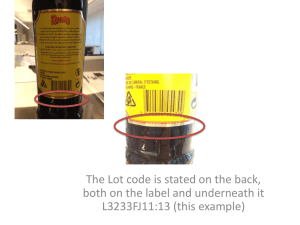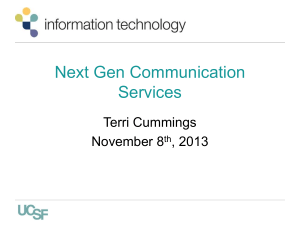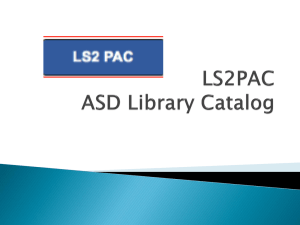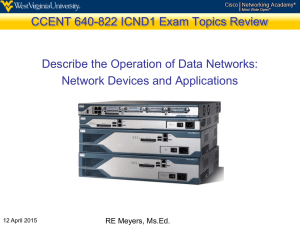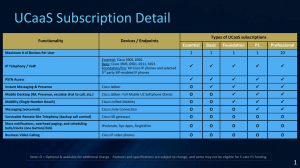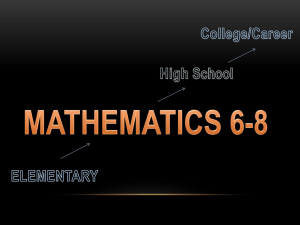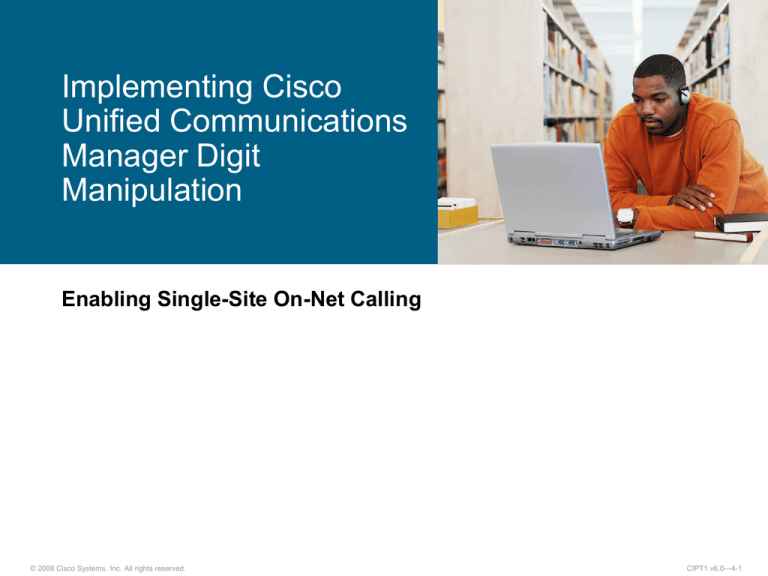
Implementing Cisco
Unified Communications
Manager Digit
Manipulation
Enabling Single-Site On-Net Calling
© 2008 Cisco Systems, Inc. All rights reserved.
CIPT1 v6.0—4-1
Outline
Cisco Unified Communications Manager Digit Manipulation Cisco
Unified Communications Manager Digit Manipulation Flow
Cisco Unified Communications Manager Digit Manipulation
Configuration Elements
Cisco Unified Communications Manager External Phone Number
Mask
Cisco Unified Communications Manager Digit Prefix and Stripping
Cisco Unified Communications Manager Transformation Masks
Cisco Unified Communications Manager Translation Patterns
Cisco Unified Communications Manager Significant Digits
Cisco Unified Communications Manager Digit Manipulation
Summary
© 2008 Cisco Systems, Inc. All rights reserved.
CIPT1 v6.0—4-2
Cisco Unified Communications Manager
Digit Manipulation Overview
© 2008 Cisco Systems, Inc. All rights reserved.
CIPT1 v6.0—4-3
Digit Manipulation
SIP 3rd party
IP Phone
Cisco IP Phones
PSTN
1002
T1/E1
CCM1-1
CCM2-1
Local
Gateways
DID:
706-5551001 to
1003
Off-Net Calls
408-555-1111
On-Net
Off-Net
Calling
1002
706-555-1002
Called
9.1408-5551111
1408-555-1111
© 2008 Cisco Systems, Inc. All rights reserved.
How to Manipulate
Calling and Called
Number?
Expand calling
directory number to
fully qualified PSTN
number
Strip access code 9
dialed internally for
PSTN access
CIPT1 v6.0—4-4
Digit Manipulation Requirements
Requirement
Call Type
Expand calling-party
directory number to full
E.164 PSTN number
Internal to PSTN
Strip PSTN access code “9”
Internal to PSTN
How
Use calling party’s external
phone number mask or calling
party transformation in route
pattern or route list
Use Digit Stripping in Route
Pattern or Route List
Expand abbreviated number
Internal to Internal
(e.g., “0” for operator)
Use Called Party Transformation
in Translation Pattern
Convert E.164 PSTN calledparty directory number to
PSTN to Internal
internal number
Internal to Internal
Overlapping endpoint
directory number
PSTN to Internal
Use Called Party Transformation
in Translation Pattern, or use
Significant Digits
© 2008 Cisco Systems, Inc. All rights reserved.
Use Called Party Transformation
in Translation Pattern
CIPT1 v6.0—4-5
Cisco Unified Communications Manager
Digit Manipulation Flow
© 2008 Cisco Systems, Inc. All rights reserved.
CIPT1 v6.0—4-6
Digit Manipulation Flow Example
(Outgoing Call to PSTN)
Dials: 9-1-303-555-6007
PSTN
1005
408-555-30xx
Step
1
2
3
4
303-555-6007
GW
408-555-3005 is
calling
Description
Extension 1005 dials 9-1-303-555-6007
Dialed number matches 9.! Route pattern configured with the following:
– Called party transformations > Discard digits: PreDot
– Calling party transformations: 40855530XX
– Route to GW
Unified CM strips off (discards) digit 9 from the dialed number and sends
13035556007 to PSTN via the GW after modifying the calling party number
from 1005 to 4085553005
PSTN phone 3035556007 rings and sees 4085553005 as the calling number
© 2008 Cisco Systems, Inc. All rights reserved.
CIPT1 v6.0—4-7
Digit Manipulation Flow Example
(Incoming Call from PSTN)
303-555-6008
408-555-30xx
PSTN
GW
Dials: 1-408-5553010
1010
Step
1
Description
PSTN phone dials 1-408-555-3010, PSTN switch routes the call to GW/Unified CM
Incoming call dialed number matches 40855530XX translation pattern configured with the
following:
2
– Called Party transformation > Called Party Transform Mask: 10XX
– (Optional) Calling Party transformation > Prefix Digit: 91
3
4
– Unified CM translates 4085553010 to 1010
– Unified CM looks up 1010 and finds a registered phone with that directory number
Unified CM presents the call to extension 1010. It will (optionally, see Step 2) prefix the
calling number with 91 to make it easier for the internal user to call back the PSTN caller
from IP phone Directory button (no need to manually add 91)
© 2008 Cisco Systems, Inc. All rights reserved.
CIPT1 v6.0—4-8
Cisco Unified Communications Manager
Digit Manipulation Configuration Elements
© 2008 Cisco Systems, Inc. All rights reserved.
CIPT1 v6.0—4-9
Digit Manipulation Configuration
Elements
Digit Manipulation Element
Characteristics
External Phone Number Mask
Designates the fully qualified E.164 address for the
user extension
Digit Prefix and Stripping
– Part of Calling/Called Transformation settings.
Prefix or strip dialed digits from a route or
translation pattern for outbound calls
Transformation Masks
Translation Pattern
Significant Digits
© 2008 Cisco Systems, Inc. All rights reserved.
– Part of Calling/Called Transformation settings.
Manipulate the dialed digits or calling party number
– Part of Calling/Called Transformation settings.
When dialed digits match the translation pattern,
Unified CM performs the translation first and then
routes the call again.
Make use of the Calling/Called Transformation
settings for digit manipulation.
Strip off digits received by Unified CM for incoming
calls from a PSTN gateway or from a trunk.
CIPT1 v6.0—4-10
Cisco Unified Communications Manager
External Phone Number Mask
© 2008 Cisco Systems, Inc. All rights reserved.
CIPT1 v6.0—4-11
External Phone Number Masks
Designates the fully qualified E.164 address for the user
extension
Used to format caller ID information for external (outbound) calls
that are made from the internal devices
Configured under Line Configuration settings, but enabled as part
of Calling Party Transformations settings.
© 2008 Cisco Systems, Inc. All rights reserved.
CIPT1 v6.0—4-12
Configuring External Phone Number
Mask
Go to Device > Phone > Find
and select the corresponding
phone
Under Association Information,
click the corresponding Line
Scroll down to Line x on Device
configuration (see picture)
Type full E.164 PSTN number in
the External Phone Number
Mask field
In the Route Patterns that point
to PSTN (e.g. 9.! or 9.@), scroll
to Calling Party Transformations
Check the Use Calling Party's
External Phone Number Mask
option
© 2008 Cisco Systems, Inc. All rights reserved.
CIPT1 v6.0—4-13
External Phone Number Mask Example
Dials: 9-1-303-555-6007
PSTN
1005
408-555-30xx
Step
1
303-555-6007
408-555-3005 is
calling
GW
Description
Extension 1005 configured with external phone number mask 40855530XX
Route pattern 9.! configured with
2
– Calling party transformations: Use Calling Party's External Phone Number
Mask option is checked
3
– Discard dialed digit 9, and route to gateway
Extension 1005 dials 9-1-303-555-6007. Unified CM replaces calling party
number to 4085553005, strips off 9 from the dialed digits and sends call to
PSTN gateway
PSTN phone 3035556007 rings and sees 4085553005 as the calling number
4
© 2008 Cisco Systems, Inc. All rights reserved.
CIPT1 v6.0—4-14
Cisco Unified Communications Manager
Digit Prefix and Stripping
© 2008 Cisco Systems, Inc. All rights reserved.
CIPT1 v6.0—4-15
Digit Prefix
Prepend digits to the pattern
Valid entries include the digits 0 through 9, *, and #
Part of Calling/Called Transformations settings
© 2008 Cisco Systems, Inc. All rights reserved.
CIPT1 v6.0—4-16
Digit Stripping
Used to strip digits from a pattern
Part of Called Party Transformations settings (Discard Digits field)
A discard digits instruction (DDI) removes a portion of the dialed
digit string before passing the number on
If no @ sign (numbering plan) is used in route pattern, only the
following DDIs are supported:
– PreDot
– NoDigits
DDI
© 2008 Cisco Systems, Inc. All rights reserved.
CIPT1 v6.0—4-17
Discard Digits Instructions (DDIs)
For example, If the pattern is 9.5@
Instructions
Discarded Digits
Used for
PreDot
95 1 214 555 1212
Removes access code digit(s)
delimited by . sign
PreAt
95 1 214 555 1212
Removes all digits that are in front
of a valid numbering plan pattern
11D/10D@7D
95 1 214 555 1212
Removes PreDot/PreAt digits and
local or long-distance area code
11D@10D
95 1 214 555 1212
Removes long distance area code
identifier (1)
IntlTollBypass
95 011 33 1234 #
Removes international access
(011) and following country code
10-10-Dialing
95 1010321 1 214 555 1212
Removes carrier access (1010)
and following carrier ID code
95 1010321 011 33 1234 #
Removes of dialed # sign (to
terminate dialing without timeout)
Trailing-#
© 2008 Cisco Systems, Inc. All rights reserved.
CIPT1 v6.0—4-18
Using PreDot DDIs
Unified CM
Match: 9.8XXX
Discard: PreDot
Called Party: 8123
User Dials: 98123
PBX
© 2008 Cisco Systems, Inc. All rights reserved.
CIPT1 v6.0—4-19
Using Compound DDIs
Use DDIs to remove carrier
selection from dialed
number. Carrier selection
consists of:
Unified CM
Match: 9.@
Discard:
PreDot 10-10-Dialing
Carrier Access Code:
1010
Carrier Identification
Code: 3 digits
Called Party:
12145551212
User Dials:
9-1010-288-1-214-555-1212
PSTN
© 2008 Cisco Systems, Inc. All rights reserved.
CIPT1 v6.0—4-20
Cisco Unified Communications Manager
Transformation Masks
© 2008 Cisco Systems, Inc. All rights reserved.
CIPT1 v6.0—4-21
Transformation Masks
Modify either the calling
number or called
number (dialed digits)
Can contain digits
0–9, *, #, and X
Applied to a number to
extend or truncate it
Part of Calling/Called
Party Transformations
settings
© 2008 Cisco Systems, Inc. All rights reserved.
An X in a mask
lets digits pass
through
45000
Mask 808236XXX
808236000
Digits in masks
replace number
digits
8082365000
Mask
45XXX
_____ 45000
Blanks block
number digits
CIPT1 v6.0—4-22
Configuring Transformation Masks
Configured under Translation
Pattern, Route Pattern, or
Route List settings
Transformation masks
configured at route list level
have priority over those
configured at route pattern
level
© 2008 Cisco Systems, Inc. All rights reserved.
CIPT1 v6.0—4-23
Cisco Unified Communications Manager
Translation Patterns
© 2008 Cisco Systems, Inc. All rights reserved.
CIPT1 v6.0—4-24
Translation Patterns
Very powerful tool to manipulate dialed digits and calling party
number for any type of call.
Can be used to either route or block certain patterns.
When the digits match the translation pattern, Cisco Unified
Communications Manager does not route the call to an outside
entity (e.g., a gateway); instead, it performs the translation first
and then routes the call (to another translation pattern or to a
route pattern).
© 2008 Cisco Systems, Inc. All rights reserved.
CIPT1 v6.0—4-25
Translation Patterns (Cont.)
Digits
Find best match
Digits
Apply calling and called
party transformations
Pattern type?
Translation pattern
Route pattern
Extend call to destination
© 2008 Cisco Systems, Inc. All rights reserved.
CIPT1 v6.0—4-26
Configuring Translation Pattern
Go to Call Routing >
Translation Pattern > Add New
Pattern
Enter the Translation Pattern,
including numbers and wildcards
(do not use spaces)
Choose a Partition and CSS (to
be discussed in the next module)
or choose <None>
Choose the Route Option to
indicate this pattern is to be used
for routing or for blocking calls
(the “blocking” option provides
similar functionality as in the
Route Pattern configuration)
Route option
Transformation
settings
Specify the Calling/Called Party
Transformation settings
(applicable only if “Route the
pattern” is selected above)
© 2008 Cisco Systems, Inc. All rights reserved.
CIPT1 v6.0—4-27
Translation Pattern Example
Send calls to unassigned DID
numbers to attendant (operator)
Translation Pattern = XXXX
Called Party Transform Mask = 4111
PSTN
Employee Attendant
Phones
(4111)
Internal Extensions
4XXX
San Jose
© 2008 Cisco Systems, Inc. All rights reserved.
Unified CM uses longest match, so
XXXX will match any nonconfigured
number and get sent to 4111
(attendant).
PSTN DID Range
408-555-1XXX
PSTN DID range does not match internal range
Translation Pattern = 4085551XXX
Called-Party Transform Mask = 4XXX
CIPT1 v6.0—4-28
Cisco Unified Communications Manager
Significant Digits
© 2008 Cisco Systems, Inc. All rights reserved.
CIPT1 v6.0—4-29
Significant Digits
Instruct Cisco Unified Communications Manager to pay attention
to only the least-significant N digits of the called number for
incoming calls from PSTN or from another Cisco Unified
Communications Manager cluster
Part of gateway and trunk configuration
Affects all incoming calls received by the gateway or trunk; not
recommended for variable-length extension numbers
© 2008 Cisco Systems, Inc. All rights reserved.
CIPT1 v6.0—4-30
Configuring Significant Digits
Go to Gateway or Trunk Configuration > Call Routing
Information – Inbound Calls
In the Significant Digits field, specify the last N digits of the called
number that you want Cisco Unified Communications Manager to
process for inbound calls received by the gateway or trunk
© 2008 Cisco Systems, Inc. All rights reserved.
CIPT1 v6.0—4-31
Significant Digits Example
303-555-6008
408555 1010
PSTN
GW
Dials: 1-408-5551010
1010
408-555-10xx
Step
1
2
3
4
Description
PSTN phone dials 1-408-555-1010. PSTN switch routes the call to gateway.
PSTN gateway device configured with the following:
– Significant Digits = 4
Cisco Unified Communications Manager will ignore all but the last 4 digits of
the called number (1010).
Cisco Unified Communications Manager looks up 1010 and finds a registered
phone with that directory number and presents the call to extension 1010.
© 2008 Cisco Systems, Inc. All rights reserved.
CIPT1 v6.0—4-32
Cisco Unified Communications Manager
Digit Manipulation Summary
© 2008 Cisco Systems, Inc. All rights reserved.
CIPT1 v6.0—4-33
Transformation Settings
Calling Party Transformations control the adaptation of calling
party numbers from enterprise format to PSTN format
Called Party Transformations manipulate the dialed digits,
Number Type, and Numbering Plan.
© 2008 Cisco Systems, Inc. All rights reserved.
CIPT1 v6.0—4-34
Calling Party Transformation Order
1. Apply the external phone
number mask
Directory Number
2. Apply the calling party
transformation mask
External Phone
Number Mask
3. Apply prefix digits
35062
21471XXXXX
2147135062
Calling-Party
Transformation
Mask
40885XX000
Caller ID
4088535000
√
40885XX000
© 2008 Cisco Systems, Inc. All rights reserved.
CIPT1 v6.0—4-35
Called Party Transformation Order
1. Apply discard digits
2. Apply the called-party
transformation mask
Dialed
Number
9 1010321 18085551221
Discard Digits
3. Apply prefix digits
10-10-Dialing
9 18085551221
Called-Party
Transformation
Mask
XXXXXXXXXX
8085551221
© 2008 Cisco Systems, Inc. All rights reserved.
Prefix Digits
8
Called Number
88085551221
CIPT1 v6.0—4-36
Transformation Example
1
Users
A - 5062
2
User Dial
Numbers
A - 91234
B - 5063
B - 91324
C - 5064
C - 91432
Wildcards allow all dialed
numbers to match one
route pattern
To: 1000
From: 5000
Extension 1000
Rings
Route Pattern
DDI
9.1XXX
Discard “9”
User Dialed
Numbers
6
5
A – 1000
B – 1000
C – 1000
“X000”
User Dialed
Numbers
Transform
Called Number
© 2008 Cisco Systems, Inc. All rights reserved.
3
Caller ID
A – 5000
B – 5000
C – 5000
User Directory
Numbers
A – 1234
B – 1324
C – 1432
4
“X000”
Transform
Calling Number
CIPT1 v6.0—4-37
Summary
In many call scenarios, it is required to manipulate the calling and
called (dialed) string before routing the call.
Cisco Unified Communications Manager digit manipulation
configuration main elements are: External Phone Number Mask,
Digit Prefix and Stripping, Transformation Masks, Translation
Pattern, and Significant Digits.
Cisco Unified Communications Manager External Phone Number
Mask designates the fully qualified E.164 address for the user’s
extension and is used to format Caller-ID information for outbound
calls from the internal devices.
© 2008 Cisco Systems, Inc. All rights reserved.
CIPT1 v6.0—4-38
Summary (Cont.)
Digit Prefix prepends digits to a pattern, Digit Stripping strips
digits from a pattern.
Transformation Masks modify either the calling number or the
called number (dialed digits).
Translation Pattern can be used to either route or block certain
patterns. When the digits match the translation pattern, Cisco
Unified Communications Manager performs the translation first
before routing the call to another translation pattern or to a route
pattern.
Significant Digits instruct Cisco Unified Communications Manager
to pay attention to only the least-significant N digits of the called
number for incoming calls from PSTN or from another Cisco
Unified Communications Manager cluster.
© 2008 Cisco Systems, Inc. All rights reserved.
CIPT1 v6.0—4-39
© 2008 Cisco Systems, Inc. All rights reserved.
CIPT1 v6.0—4-40


